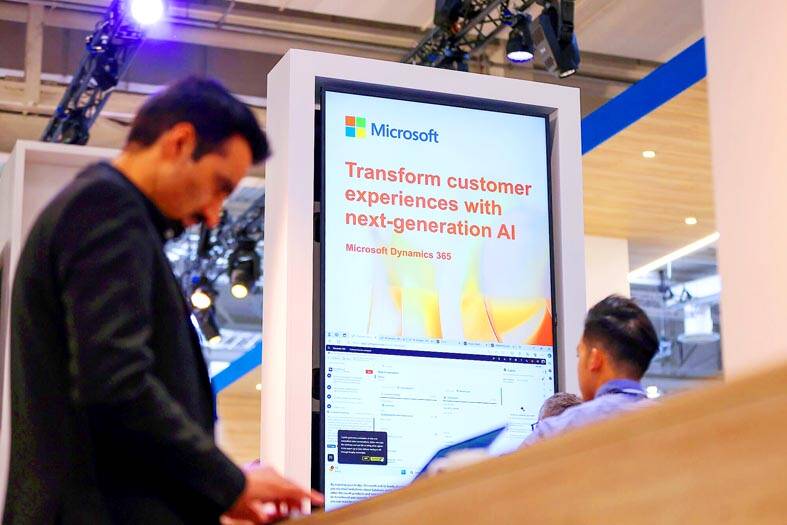Google and Microsoft Corp shares rallied yesterday as the technology bellwethers showed that hefty investments into artificial intelligence (AI) could reap more immediate revenue returns, a sharp contrast to Meta Platforms Inc’s view that AI is a long-term bet.
Microsoft’s shares advanced 3.84 percent in trading before the US market opened, after the company beat Wall Street estimates for third-quarter revenue and profit, driven by gains from the adoption of AI across its cloud services.
Google-parent Alphabet Inc soared an even-steeper 11.5 percent, poised to top US$2 trillion in market value, after not only beating quarterly estimates, but also rewarding investors with its first-ever dividend and a US$70 billion stock buyback plan.

Photo: Bloomberg
That sparked a 1 to 3 percent rise in the shares of other big technology companies, including Amazon.com Inc, Apple Inc, Nvidia Corp and even Meta Platforms, whose stock price tumbled more than 10 percent on Thursday as the social media firm signaled its costly AI bets could take years to pay off.
The technology titans have been locked in a fierce battle in the race for generative AI, which can create text, videos and photographs from prompts and is seen as the next frontier, but analysts are divided over whether Alphabet or Microsoft wears the AI crown.
“Microsoft continues to put together masterpiece after masterpiece as this quarter represents its dominant position in the AI revolution,” Wedbush Securities analyst Daniel Ives said.
However, Scott Devitt, Ives’ colleague at Wedbush, said: “We think the results further validate Google’s position as a leading AI beneficiary.”
Microsoft has access to OpenAI’s coveted AI technologies, which it has been working to infuse across its product portfolio, such as in Bing, Microsoft 365 and, most importantly, the Azure cloud-computing platform.
“AI services contributed seven points of growth” to the 31 percent jump in revenue from Azure, Microsoft finance chief Amy Hood said.
While Goldman Sachs said Microsoft is well-placed to replicate the success of its Azure buildout playbook in its AI-laced suite, Oppenheimer Holding Inc predicted the company’s AI dominance would be reminiscent of a couple of decades back.
“We see it revisiting its PC-era-type dominance, but of a 1,000 times larger market as it is the dominant AI platform for enterprises,” analyst Timothy Horan said.
On the other hand, Alphabet chief executive officer Sundar Pichai touted Google’s AI offerings as a boon to its market-leading service — core search results.
“Google’s Q1 ranked somewhere north of outstanding... and management appears in better control of its own AI narrative,” RBC analyst Khadijah Gibson said.
“Aside from a similarly-sized capex guide up as Meta, Google is more than weathering the GenAI concerns,” Gibson added.
If pre-market gains held, Alphabet, Wall Street’s fourth-most valuable company, would cross the US$2 trillion in market value on an intraday basis — a milestone it last hit, but failed to hold on to, three years ago, LSEG Datastream said.
Three of the so-called “Big Six” have reported quarterly results so far. Of the remaining, Amazon, now the only one that does not pay a dividend, is due to report results next week.

Taiwan Semiconductor Manufacturing Co (TSMC, 台積電) secured a record 70.2 percent share of the global foundry business in the second quarter, up from 67.6 percent the previous quarter, and continued widening its lead over second-placed Samsung Electronics Co, TrendForce Corp (集邦科技) said on Monday. TSMC posted US$30.24 billion in sales in the April-to-June period, up 18.5 percent from the previous quarter, driven by major smartphone customers entering their ramp-up cycle and robust demand for artificial intelligence chips, laptops and PCs, which boosted wafer shipments and average selling prices, TrendForce said in a report. Samsung’s sales also grew in the second quarter, up

On Tuesday, US President Donald Trump weighed in on a pressing national issue: The rebranding of a restaurant chain. Last week, Cracker Barrel, a Tennessee company whose nationwide locations lean heavily on a cozy, old-timey aesthetic — “rocking chairs on the porch, a warm fire in the hearth, peg games on the table” — announced it was updating its logo. Uncle Herschel, the man who once appeared next to the letters with a barrel, was gone. It sparked ire on the right, with Donald Trump Jr leading a charge against the rebranding: “WTF is wrong with Cracker Barrel?!” Later, Trump Sr weighed

LIMITED IMPACT: Investor confidence was likely sustained by its relatively small exposure to the Chinese market, as only less advanced chips are made in Nanjing Taiwan Semiconductor Manufacturing Co (TSMC, 台積電) saw its stock price close steady yesterday in a sign that the loss of the validated end user (VEU) status for its Nanjing, China, fab should have a mild impact on the world’s biggest contract chipmaker financially and technologically. Media reports about the waiver loss sent TSMC down 1.29 percent during the early trading session yesterday, but the stock soon regained strength and ended at NT$1,160, unchanged from Tuesday. Investors’ confidence in TSMC was likely built on its relatively small exposure to the Chinese market, as Chinese customers contributed about 9 percent to TSMC’s revenue last

LOOPHOLES: The move is to end a break that was aiding foreign producers without any similar benefit for US manufacturers, the US Department of Commerce said US President Donald Trump’s administration would make it harder for Samsung Electronics Co and SK Hynix Inc to ship critical equipment to their chipmaking operations in China, dealing a potential blow to the companies’ production in the world’s largest semiconductor market. The US Department of Commerce in a notice published on Friday said that it was revoking waivers for Samsung and SK Hynix to use US technologies in their Chinese operations. The companies had been operating in China under regulations that allow them to import chipmaking equipment without applying for a new license each time. The move would revise what is known